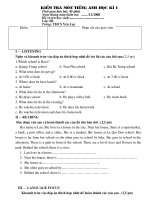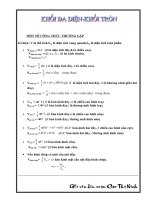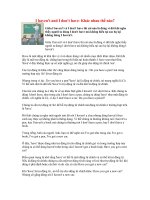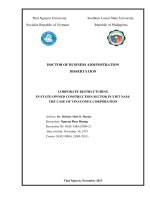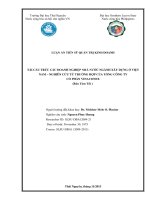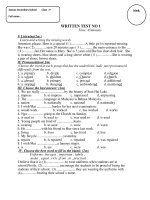- Trang chủ >>
- Đại cương >>
- Toán rời rạc
test n°1 test n13 i choose the correct answer 1 i don’t remember the front door when i left home this morning a to lock b locking c locked d to have locked 2 banks only money if they are sure it will
Bạn đang xem bản rút gọn của tài liệu. Xem và tải ngay bản đầy đủ của tài liệu tại đây (84.35 KB, 4 trang )
<span class='text_page_counter'>(1)</span><div class='page_container' data-page=1>
<b>Test N13</b>
<i><b>I. Choose the correct answer</b></i>
1. I don’t remember ... the front door when I left home this morning.
A. to lock B. locking C. locked D. to have locked
2. Banks only ... money if they are sure it will be paid back.
A. borrow B. lend C. interest D. charge
3. I left my last job because I had no ... to travel.
A. place B. position C. opportunity D. possibility
4. In order to buy his house he had to obtain a large ... from his bank.
A. loan B. finance C. capital D. debt
5. How many people do you think his car would ...?
A. occupy B. hold C. fit D. load
6. Under the circumstances it ... be best to wait for a few weeks.
A. seemed B. ought C. might D. should
7. Students sometimes support themselves by ... of evening jobs.
A. ways B. means C. efforts D. method
8. The newspaper did not mention the ... of the damage caused by the fire.
A. range B. extent C. amount D. quantity
9. The student failed to meet the necessary ... for admission to the course.
A. fulfillments B. requirements C. qualities D. aptitudes
10. No one really knows who composed this piece of music, but it has been ... to Bach.
A. identified B. associated C. referred D. attribute
<i><b>II. Give the correct forms of the words in brackets</b></i>
1. Can you measure the ... of this window? (BROAD)
2. Various kinds of flowers ... this garden. (BEAUTIFUL)
3. We had a marvelous holiday and our trip to Dalat was ... . (FORGET)
4. She got very angry but later, she apologized for her ... . (PATIENT)
5. His boss told him off because he had behaved ... . (RESPONSIBLE)
6. This knife is very blunt. It needs ... (SHARPEN)
7. The government have had plans to ... our country. (INDUSTRY)
8. The professor explained his ideas with great ... (CLEAR)
9. He ... to hit me if I didn’t hand over my money. (THREAT)
10. It was a complete ... due to poor planning. (FAIL)
<i><b>III. Give the correct forms of the verbs in brackets</b></i>
1. - Would your children mind (keep) quiet for a moment. I’m trying (fill) in a form.
- It’s no use (ask) children (keep) quiet. They can’t help (make) a notice.
2. The teacher asked those who (complete) their tests (turn) in their papers.
3. The police just (put up) a railing here (prevent) people(rust) out of the station and (dash)
straight across the road.
If he (not drink) too much last night, he (not have) a bad headache.
5. Since he (buy) a new car, he (drive) (work) every day.
6. I hope Brenda still (work) for me when I retire in six years’ time. She (retire) herself a few
years afterwards, because she then (be) sixty. She (work) for the firm for twenty years by then.
<i><b>IV. Rewrite the following sentences in the way that it means exactly the same as the sentences</b></i>
<i><b>printed before it</b></i>
1. It was careless of you to leave the windows open last night.
You shouldn’t ...
2. I am sorry I was rude to you last night.
I apologize ...
3. “Why didn’t you report the incident to the police last week?” The officer asked her.
The officer wanted ...
</div>
<span class='text_page_counter'>(2)</span><div class='page_container' data-page=2>
4. We must find him no matter where he is hiding.
Wherever ...
5. A country can’t be prosperous if it’s not quite independent.
Only ...
6. They went on smoking all through the meal.
They didn’t ...
7. These new machines have put an end to queuing.
Before these ...
8. The instructions say you just add boiling water to the soup powder.
The soup powder ...
9. The house seemed to have been unoccupied for several months.
It looked ...
10. I remembered and so did she.
He didn’t ...
<i><b>V. Read the following passage and answer the questions</b></i>
The accuracy of scientific observations and calculations is always at the mercy of the scientist’s
time keeping methods. For this reason, scientists are interested in devices that give promise of
more precise time keeping.
In their search for precision, scientists have turned to atomic clocks that depend on various
vibrating atoms or molecules to supply their “ticking”. This is possible because each kind of
atom or molecule has its own characteristic rate of vibration. The nitrogen atom in ammonia, for
example, vibrates or “ticks” 24 billion times a second.
One such atomic clock is so accurate that it will probably lose no more than a second in 3000
years. It will be of great importance in fields such as astronomical observation and long range
navigation. Te heart of this Atomichron is a cesium atom that vibrates 9.2 billion times a second
when heated to the temperature of boiling water.
An atomic clock that operates with an ammonia molecule may be used to check the accuracy of
predictions based on Einstein’s relativity theories, according to which a clock in motion and a
clock at rest should keep time differently. Placed in an orbiting satellite moving at a speed of
18,000 miles an hour, the clock could broadcast its time readings to a ground station, where they
would be compared with the readings on a similar model. Whatever differences develop would
be checked against the differences predicted.
1.The selection says that the accuracy of scientific observation depends on
A. methods of measurement. B. time keeping methods.
C. basic assumptions. D. earlier experiments.
2. Scientists expect that atomic clock will be
A. more precise. B. absolutely accurate. C. more durable. D. indestructible.
3. Atomic clocks differ according to
A. function B. type of molecule or atom used C. rate of vibration D. both B & C
4. the Atomichron will be used in
A. making astronomical observations. B. broadcasting.
C. measuring vibration rates. D. all of the above.
5. From the selection, we may assume that temperature changes
A. affect only ammonia molecules. B. may affect vibration rate of atoms.
C. affect the speed at which atoms travel. D. do not affect atoms in any way.
6. Identical atomic clocks may be used to check
A. the effects to outer space on an atomic clock. B. the actual speed of an orbiting satellite.
C. the accuracy of predictions based on theories of relativity. D. all of Einstein’s theories.
7. Implied but not stated:
A. Precise time taking is essential in science.
B. Scientists expect to disprove Einstein’s relativity’s theories
</div>
<span class='text_page_counter'>(3)</span><div class='page_container' data-page=3>
C. Atomic clocks will be important in space flight.
D. The rate of vibration of an atom never varies.
8. An appropriate title for this selection would be:
A. A Peacetime Use of the Atom B. Atoms and Molecules
C. The Satellite Timekeepers D. The Role of the Clock
<i><b>VI. Fill in each numbered blank with a suitable word</b></i>
One morning last summer Jessie (1)...some sandwiches for her husband’s lunch. They
were sausage sandwiches. There was one small sausage (2)... over, so Jessie gave
(3)...to Henry, her little dog. Henry ate it up. Half an hour (4)..., the dog got ill.
He kept (5)... shaking his head, and rubbing it (6)... his foot. Jessie thought,
“He’s ill. He must have eaten (7)... that didn’t agree with him. Maybe that
(8)... was bad.” Then she remembered her husband’s (9)... She ran to the
telephone and (10)... Jim at his office in town.
<i><b>VII. Pick out the word whose underlined part is pronounced differently from those of the</b></i>
<i><b>others</b></i>
1. a. jumbo b. junior c. junk d. juggle
2. a. management b. manacle c. malt d. malfunction
3. a. troll b. doll c. tropical d. otter
4. a. relents b. religion c. relics d. relive
5. a. spill b. shield c. cement d. executive
6. a. third b. threat c. thus d. thunder
7. a. wholly b. whiten c. whose d. whoop
8. a. launch b. digestion c. question d. Greenwich
9. a. canoe b. career c. carnivore d. carouse
10. a. hood b. hook c. doom d. good
<i><b>VIII. Sentence building</b></i>
1. I / be / invited / her party / the occasion / her 18th<sub> birthday / last week.</sub>
………..
2. Outside / shop / a lot of people / selling fruit / other things.
………..
3. She / used to / stay / her uncle’s / she / a child.
………..
4. I / write / Jim / last week. / But so far / I / not receive / any reply.
………..
5. He / used to / play tennis / but / now / turn / football.
………..
6. She wondered / why / Peter / not phone / her.
………..
7. police / prevent / prisoners / escape.
………..
8. car / cost / me / few hundred pounds / only.
………..
9. It / impossible / them / come / Sunday.
………..
10. He / investigate / case / a week.
………..
</div>
<span class='text_page_counter'>(4)</span><div class='page_container' data-page=4>
<b>Answer keys to test N13</b>
<b>I. </b>
1.A 2.B 3.C 4.A 5.B 6.D 7.B 8.B 9.B 10.D
<b>II.</b>
1. breadth 2. beautify 3. unforgettable 4. impatience 5. irresponsibly
6. sharpening 7. industrialize8. clarify/clearness 9. threatened 10. failure
<b>III.</b>
1.keeping, to fill, asking, to keep, making 2. had completed, to turn
3. have just put, to prevent, rushing, dashing 4. hadn’t drunk, wouldn’t have had
5. bought, has been driving, to work 6. will be working, retires, will then be, will have been working
<b>IV.</b>
1. You shouldn’t have left the windows open last night.
2. I apologize for being rude to you last night.
3. The officer wanted to know why she hadn’t reported the incident to the police the previous
week.
4. Wherever he is hiding we must find him.
5. Only when it’s quite independent can a country be prosperous.
6. They didn’t stop smoking all through the meal.
7. Before these new machines were invented, people had to queue.
8. The soup powder just needs boiling water added to it according to the instructions.
9. It looked as if (though) the house had been unoccupied for several months.
10. He didn’t forget and neither did she.
<b>V.</b>
1. B 2. B 3. D 4. A 5. B 6. C 7. A 8. A
<b>VI.</b>
1. made / prepared 2. left 3. it 4. later 5. on
6. with 7. something 8. sausage 9. sandwiches 10. called / phoned
<b>VII.</b>
1. b 2. c 3. a 4. c 5. b 6. c 7. b 8. b 9. c 10. c
<b>VIII.</b>
1. I was invited to her party on the occasion of her 18th<sub> birthday last week.</sub>
2. Outside the shop there were / are a lot of people selling fruit and other things.
3. She used to stay at her uncle’s when she was a child.
4. I wrote to Jim last week. But so far I have not received any reply yet.
5. He used to play tennis but now he turns to football.
6. She wondered why Peter did not phone her.
7. The police have prevented prisoners from escaping.
8. The car cost me a few hundred pounds only.
9. It is impossible for them to come on Sunday.
10. He has been investigating the case for a week.
</div>
<!--links-->
